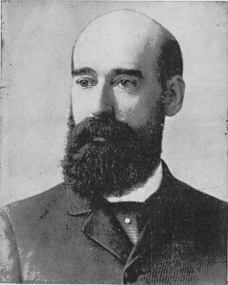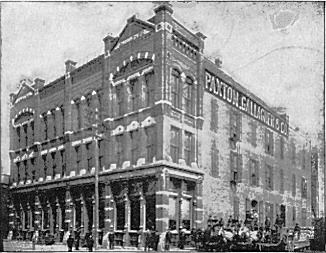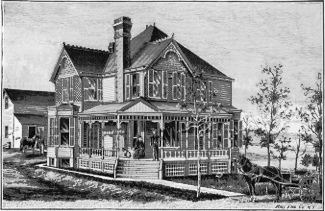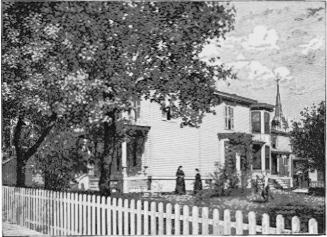|
OMAHA
ILLUSTRATED.
[W. J. Broatch was born
in Middletown, Connecticut, July 31, 1841, and was educated
in the common and high schools of his native town. When
seventeen years of age he went to Hartford where he resided
until the civil war broke out, when he enlisted in
the
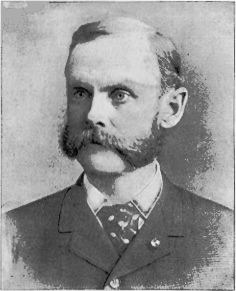
MAYOR W. J. BROATCH.
|
Eighth Connecticut volunteers. After serving
with that regiment a year and a half, he left it
and entered the regular army. During the war his
first service was with Gen. Burnside in the North
Carolina expedition and he was at the capture of
Roanoake, etc. Later he was with Gen. Grant in the
army of the Potomac at Spottsylvania, the
Wilderness, etc. He first came to Omaha in 1866 as
aide on the staff of Philip St. George Cooke, at
which time the Department of the Platte was
created. Later he was detailed by President Grant
to take charge of Indians, and was assigned to duty
under the Department of the Interior at the Yankton
Indian Agency. After a year's service there he
asked to be placed on waiting orders, with a view
to leaving the service and resigned his captain's
commission in the regular army, December 31, 1870,
and went to Ohio where he engaged in business. On
March 1, 1874, Mr. Broatch came to Omaha and
established himself in the heavy hardware business,
which he has successfully conducted ever since. He
has been an active and public spirited citizen,
taking an interest in all movements calculated to
promote the material progress of Omaha. He has for
years been a member of the board for the
improvement of the Missouri river, is a member of
the Omaha Board of Trade and of the Omaha Freight
Bureau. He was a member of the school board in
1878-9 and was elected to the State Legislature in
1880 for two years. In June, 1887, he was elected
Mayor of Omaha under the amended charter to serve
until January, 1890. As such he is ex-officio
president of the Board of Fire and Police
Commissioners, which body was provided for in the
new charter to give to the city a system of
metropolitan police.
|
|
The inauguration of new systems in city
government and the enlargement of its powers
necessarily involve much labor and wise discretion
on the part of those charged with official
responsibility, and Mr. Broatch has applied himself
to his new duties with a zeal that cannot be
questioned.]
|
|
|
|
|
|
[C. S.
Goodrich was born in Warren, Warren county,
Pennsylvania, July 5, 1842. As a boy he learned the
printer's trade, and came to Omaha with his parents
April 6, 1860. Here he worked at the case on the
Weekly Republican and later on the Omaha
Nebraskian. When the Daily Telegraph was started,
of which Henry Z. Curtis, a son of the late Major
General Curtis, was editor, Mr. Goodrich worked at
the case upon it with C. W. Sherman, the present
editor of the Plattsmouth Journal. The Telegraph
was announced to be published simultaneously in
Omaha and Council Bluffs and four hundred copies
were printed daily, two hundred of which were sent
by a boy on a pony across the river for
distribution there. Mr. Curtis was afterwards
killed during the Kansas troubles by Quantrell in
the Lawrence massacre. During the Indian scare
under Gov. Alvin Saunders' administration, Mr.
Goodrich was a captain of a militia company raised
for home protection, and he admits that more women
and children were scared by the militia men than by
the Indians, who never came near the town. Mr.
Goodrich was engaged in mercantile pursuits for
twenty years in Omaha previous to 1887, when he
retired. In 1885 he was elected to the city council
for two years, and in June, 1887, under the new
charter, he was elected city comptroller to serve
until January, 1890, being the only candidate on
the Democratic general ticket elected. Like others
of the pioneers of Omaha, Mr. Goodrich has seen the
little village grow to be a great and flourishing
city, and the State in its Marvelous development,
keep pace with it.
|
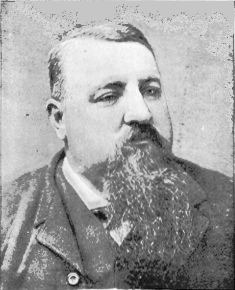
COMPTROLLER C. S. GOODRICH.
|
[102]
|
